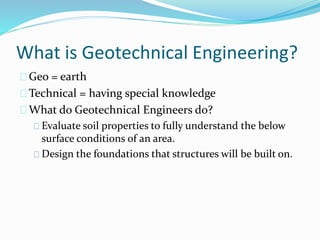6 Easy Facts About Geotheta Described
6 Easy Facts About Geotheta Described
Blog Article
Geotheta Things To Know Before You Get This
Table of ContentsThe Of GeothetaWhat Does Geotheta Do?The Single Strategy To Use For GeothetaSome Ideas on Geotheta You Need To KnowLittle Known Questions About Geotheta.

They conduct website examinations, collect examples, do laboratory tests, and examine information to evaluate the viability of the ground for construction projects - Geo Tech Engineering. Based upon their searchings for, geotechnical engineers supply referrals for structure layout, incline security, retaining structures, and mitigation of geotechnical risks. They team up with other specialists, such as architects, structural designers, and building and construction groups, to make certain that geotechnical factors to consider are incorporated into the overall project design and execution
By assessing the actions and homes of soil and rock, they can identify potential geotechnical hazards such as landslides, soil settlement, or incline instability. Their expertise aids avoid failures or crashes that can threaten lives and building. Right here are some thorough tasks and obligations of a geotechnical engineer: Website Investigation: Geotechnical designers conduct site investigations to collect data on subsurface problems.
They translate the information to comprehend the buildings and actions of the dirt and rock, including their stamina, permeability, compaction qualities, and groundwater conditions. Geotechnical Evaluation and Style: Geotechnical designers examine the information gathered throughout site examinations to examine the security and viability of the website for building and construction tasks. They do geotechnical estimations and modeling to examine aspects such as bearing capacity, negotiation, slope stability, lateral earth stress, and groundwater circulation.
Geotheta Fundamentals Explained
Foundation Layout: Geotechnical engineers play a crucial function in designing structures that can securely support the intended framework. They assess the dirt problems and load needs to figure out the appropriate structure kind, such as shallow structures (e.g., grounds), deep foundations (e.g (https://www.merchantcircle.com/blogs/geotheta-miami-fl/2024/8/Why-Geotechnical-Engineers-at-Geotheta-Are-Your-Best-Bet/2781881)., stacks), or specialized strategies like dirt renovation. They think about aspects such as settlement restrictions, birthing capability, and soil-structure communication to establish ideal structure designs
They assess building plans, display site tasks, and carry out field examinations to confirm that the design referrals are complied with. If unexpected geotechnical concerns occur, they assess the scenario and supply suggestions for remediation or modifications to the design. Threat Evaluation and Reduction: Geotechnical designers examine geotechnical hazards and threats associated with the task site, such as landslides, liquefaction, or dirt erosion.

Cooperation and Interaction: Geotechnical designers work very closely with other professionals entailed in a project, such as designers, structural designers, and building teams. Efficient interaction and collaboration are necessary to integrate geotechnical factors to consider into the total project style and building and construction process. Geotechnical designers provide technical know-how, answer inquiries, and ensure that geotechnical requirements are satisfied.
The Main Principles Of Geotheta
Right here are some kinds of geotechnical designers: Structure Engineer: Foundation engineers focus on creating and analyzing foundations for structures. They analyze the soil conditions, lots requirements, and website attributes to identify one of the most ideal structure kind and layout, such as shallow foundations, deep foundations, or specialized techniques like pile structures.
They review the variables affecting incline stability, such as soil properties, groundwater problems, and incline geometry, and establish techniques to avoid slope failures and minimize threats. Quake Engineer: Earthquake engineers Homepage concentrate on assessing and making frameworks to stand up to seismic pressures. They evaluate the seismic risk of a site, review dirt liquefaction capacity, and create seismic layout requirements to make sure the safety and resilience of structures throughout quakes.
They do field testing, collect samples, and analyze the collected information to identify the dirt homes, geologic formations, and groundwater problems at a site. Geotechnical Instrumentation Designer: Geotechnical instrumentation engineers focus on surveillance and gauging the habits of dirt, rock, and structures. They install and maintain instrumentation systems that monitor aspects such as soil negotiation, groundwater levels, slope movements, and architectural displacements to evaluate efficiency and offer early cautions of prospective concerns.
Indicators on Geotheta You Need To Know
They carry out examinations such as triaxial examinations, loan consolidation tests, direct shear tests, and leaks in the structure tests to gather data for geotechnical evaluation and layout. Geosynthetics Engineer: Geosynthetics engineers specialize in the layout and application of geosynthetic products, such as geotextiles, geogrids, and geomembranes. They utilize these materials to improve soil stability, reinforce slopes, offer drainage options, and control erosion.
They have a tendency to be investigatory people, which implies they're intellectual, introspective, and inquisitive. They are curious, systematic, rational, analytical, and rational. A few of them are also social, indicating they're kind, generous, cooperative, client, caring, helpful, empathetic, tactful, and friendly. Does this noise like you? Take our cost-free profession test to discover if geotechnical designer is one of your leading profession suits.
In the office environment, geotechnical designers make use of specialized software application tools to carry out computations, produce styles, and examine data. They prepare records, review project specifications, connect with customers and staff member, and coordinate task tasks. The office setup offers a helpful atmosphere for research, evaluation, and partnership with various other experts associated with the task.
The Buzz on Geotheta
They regularly go to task sites to carry out website investigations, analyze geotechnical problems, and gather data for evaluation. These sees entail traveling to different places, often in remote or difficult terrains. Geotechnical engineers might perform soil tasting, conduct tests, and display building tasks to make certain that the geotechnical elements of the project are being applied properly.
Geotechnical engineers additionally function in specialized geotechnical research laboratories. Geotechnical research laboratory designers function thoroughly in these environments, dealing with testing equipment, operating instruments, and recording information.
Report this page